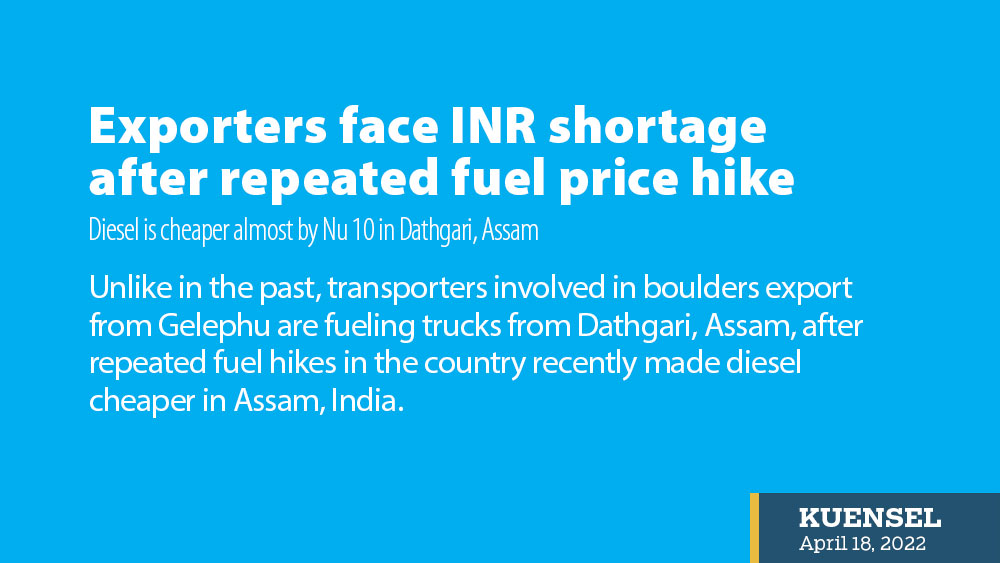Diesel is cheaper almost by Nu 10 in Dathgari, Assam
Nima
Unlike in the past, transporters involved in boulders export from Gelephu are fueling trucks from Dathgari, Assam, after repeated fuel hikes in the country recently made diesel cheaper in Assam, India.
A litre of diesel is cheaper by almost Nu 10 in Dathgari, the small border town across Gelephu. A litre of diesel cost Nu 101 in Gelephu and Nu 90.2 in Assam.
Exporters said that before the fuel price hike, transporters refueled trucks from the dry port in Gelephu.
Without banks issuing Indian currency to boulder exporters, exporters from Gelephu have to exchange Bhutanese currency in Dathgari at a depreciated value of seven to 10 percent.
An exporter, Chencho Gyeltshen, said that exporters must be given Indian currency for export to India and Bangladesh. “Transporters fuel trucks in Assam and we have to pay them in Indian currency. Indian Rupees (INR) should be issued whether the export is to India or Bangladesh. The route we follow is through India.”
He said that there was no need for INR if the transactions were done in cash. “Every time, the value of Bhutanese currency is down by seven percent when we exchange from across the border. It’s a huge loss for us.” The Ngultrum is officially pegged to the INR.
Currently, only export to Bangladesh is given Rs 15,000 per truck after receiving the letter of credit, an important export document. Almost all exporters use a real-time gross settlement (RTGS) system for the payment related to exports today.
Exporters have appealed to the Bhutan Export Association requesting INR for export to India, as the fueling has become cheaper in Assam, India.
The fuel price in Assam and a few other states across India have become cheaper than in Bhutan after the state government revised subsidies and taxation in the face of increasing fuel prices globally. Fuel price had always been cheaper in Bhutan with Indians residing across the border coming to Bhutan to refuel their vehicles.
The central government in India has reduced the excise duty on diesel by Rs 10 per litre and petrol by Rs 5 per litre. The state government has also reduced the value-added tax on petrol and diesel by Rs 7 per litre, according to reports from India.
Exporters say transporters are leaving for other projects in India, as the exports from Gelephu were inconsistent since the beginning.
“Even exporting to Bangladesh is a big challenge. Transporters fuel here in Gelephu before. Rs 15,000 was enough for fueling. But exporters have to manage Rs 25,000 for fueling today,” an exporter said.
He said that exporters have lost the trust of transporters and many started leaving for other projects in India. “I think fuel prices will return to normal soon. Or else, it would be difficult to sustain the business,” said Raju Upreti, an exporter.
Exporters said fuel prices could have become cheaper in some states in India after the subsidy remained the same in the country despite the increase in fuel price.
They also said fuel prices were always higher in India.
Raju Upreti said the frequent disturbance in export would have a long-term impact on the export business. “Transporters lost interest in working with us already. It is difficult to bring them back after they leave.”
Exporters couldn’t make advance payments for transporters without banks issuing INR for export to India.
Officials from Bhutan Export Association said the INR shortages surfaced in Gelephu after all payment transactions related to export were brought online through banks.
Programme officer with BEA, Guru Wangchuk, said the increase in fuel price aggravated the situation. “Earlier, transporters fueled trucks in Gelephu. We also discussed with the officials in Phuentsholing to facilitate INR for export to India.”
Officials from BEA would be discussing the INR problem concerning export to India today with the Royal Monetary Authority in Phuentsholing.


